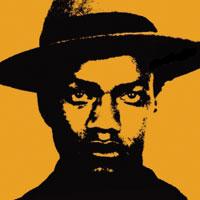
**Stay Sucka Free!
F. Negro.
* I deliberately use the word accessory, because in no way whatsoever should hip hop be completely responsible for such development, but to ignore its power and presence is simply naive.
you must be open to be inspired...and there is no discrimination. the portal has to be receptive for the muse to be discovered.

 Anti-Requiem:
Anti-Requiem:For the past year and a half I have been exposed to a battery of traditions from the African Diaspora that to date had only been noteworthy pages in the many books that I decided to consume in an effort to expropriate some cultural material/capital. Traditions that have been on the periphery, at best, in the Black(African) experience in the U.S., but are connected in very intimate ways nonetheless.
I'm speaking specifically of the Afro-Cuban cultural palette. Without going into great detail, Cuba has been in conversation with the U.S. since the first slaves arrived in the western hemisphere. Most of which were negotiating this new space by preserving, modifying and syncretizing spiritual systems and social traditions in an attempt to respond to a moral and cultural imperative that urges those with any ethnic foundation(e.g. Yoruba, Carabali, Arara, Bantu-Congo) to maintain those traditions to the best of their ability. We see elements of this throughout the Diaspora whether it shows up in Jazz, Spiritual Baptists, Timba, Reggae, Gaga, Candomble, Cumbia or Zouk.
Lately, I've been deeply exploring the Cuban component of these retentions thanks to the many new acquaintances and companions I've made as a result of my current employment situation. And it has been rewarding in ways that words can't capture! It speaks to a place in my spirit that was severely neglected until now. Prior to my recent contact I knew about Cuba through my spiritual practices and my interest in Latin dance, but never had any direct contact with Black Cubans or those who were custodians and purveyors of Afro-Cuban culture. Amongst other things, I've had the opportunity to learn how to play Bata, which for spiritual reasons has been and will continue to be crucial to my development, but I want to dedicate this blog entry to an expression that has slowly captured my attention: Rumba. Rumba emerged in the 19th century as a secular dance and music among Black Cubans from various ethnic groups, including: the Lucumi (Yoruba), Abakua (Carabali), Arara (Dahomey) and other Bantu related groups. Both sacred and secular traditions of these groups influence Rumba, especially the Abakua and Bantu forms such as Yuka and Makuta. There are three main types of Rumba: Yambu, Guaguanco and Columbia.
But why the hell am I writing about this?! Well, because I feel Rumba has created a space for me to re-imagine life. It challenges pedestrian notions of existence, in that, Rumba with its transnational presence transforms once sterile space(physical, mental, spiritual, political) into a dense, dialectic composite of identity in constant maintenance and (re)construction. Rumba urges me to think about how I relate to myself, which subsequently informs how I relate to the world. This I gather even though I don't fully understand it conceptually, musically or choreographically. Regardless of that I found this message, my discovery, critical and important enough to share. So, if you get a minute explore Rumba. It may touch you as well. But for now, enjoy the clip above. Roman Diaz, Pedrito Martinez and Alfredo Diaz rumbeando for a good friend of mine on her birthday. I thank her for being a crucial conduit in my discovery of Rumba. Gracias Berta!
**Stay sucka free!
F.Negro
*This is a Rumba at Berta Jottar's house celebrating her birthday on Ojo-Obatala. (Williamstown, MA-September 24, 2007)

